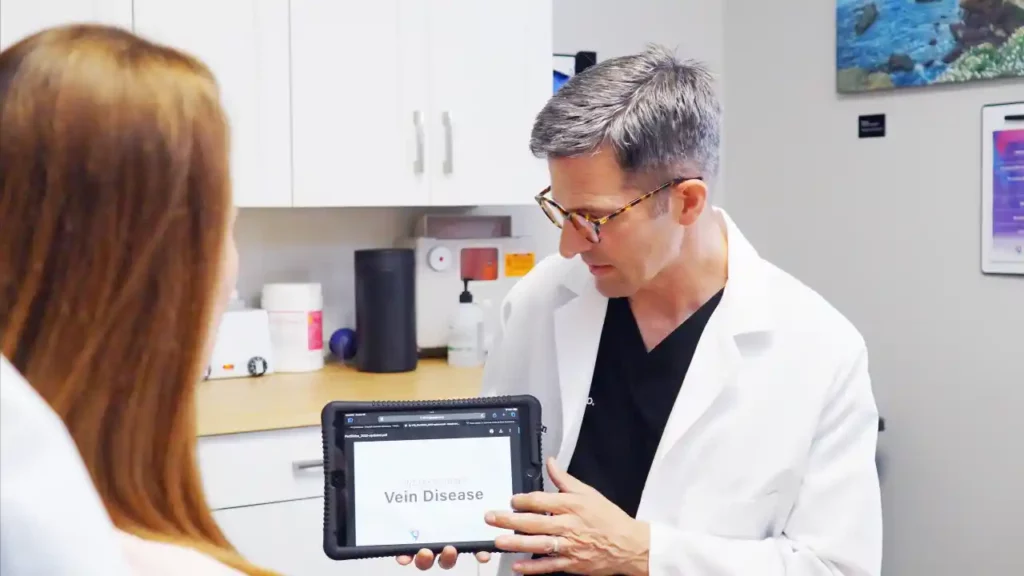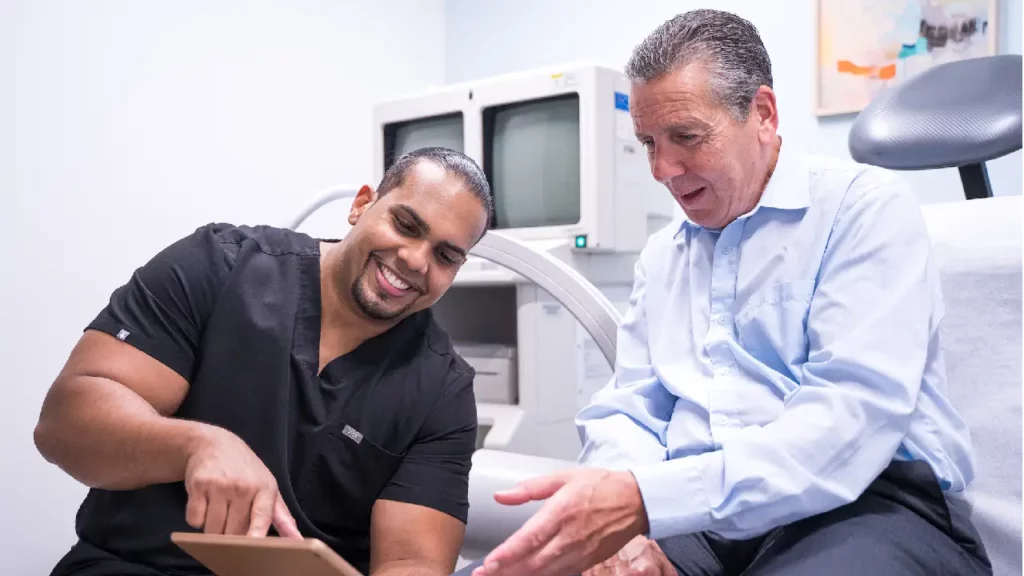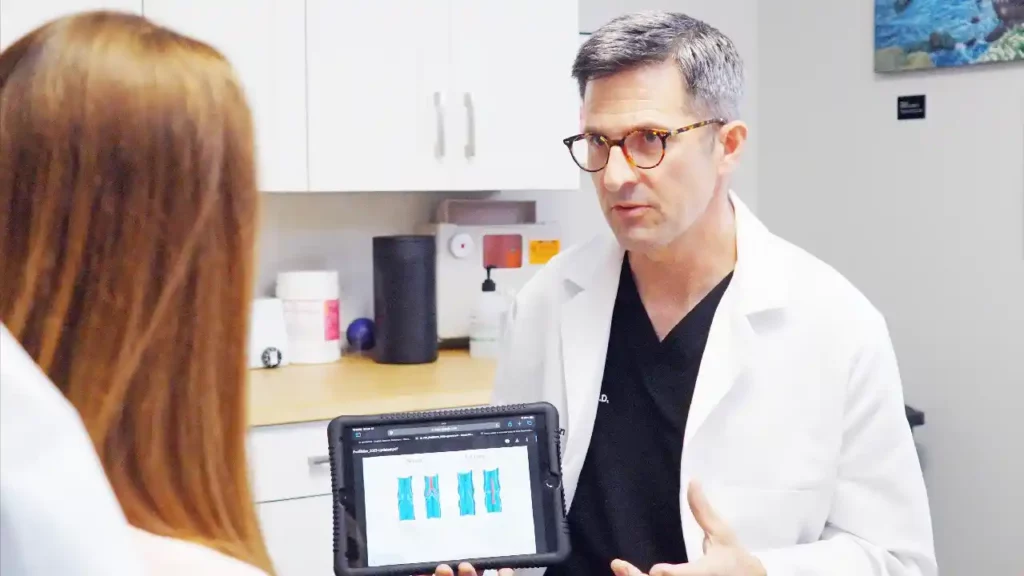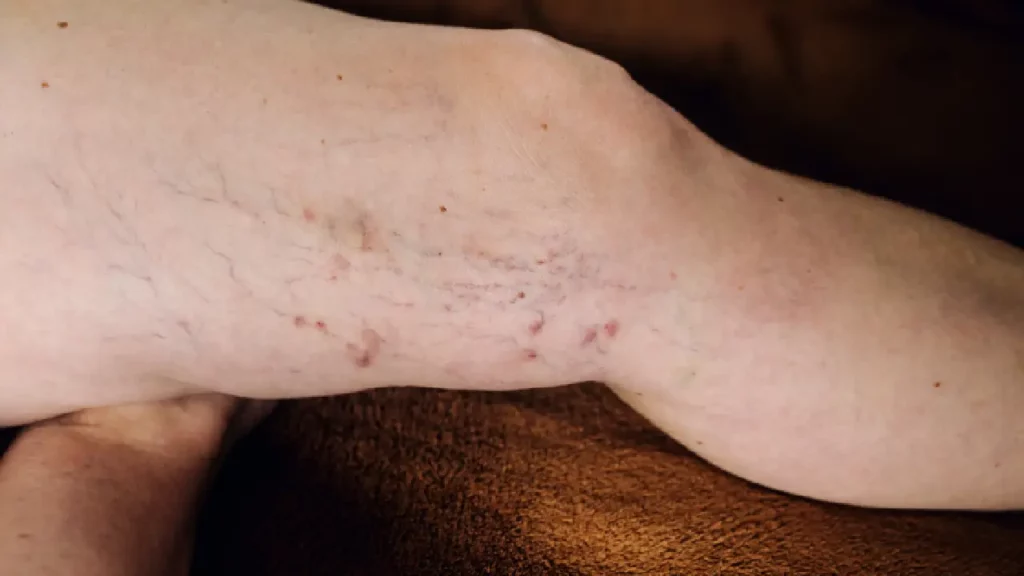Learn How to Recognize if You Have Venous Insufficiency
You’ve had a long day at work, where you spent hours on your feet or sat at your desk. By the time evening rolls around, your legs feel heavy, achy, and swollen. You notice faint bluish veins criss crossing your calves and wonder if it’s just fatigue or something more. You’ve heard of varicose veins and spider veins but haven’t given them much thought. However, what you’re experiencing might be more than just tired legs—it could be venous insufficiency.
Venous insufficiency is a condition that affects the veins in your legs, impairing their ability to return blood to your heart. This leads to blood pooling in your lower extremities, causing various symptoms that can worsen over time if left untreated. At Vein Doctor for Women, our vein doctors are dedicated to diagnosing and treating this common yet often overlooked condition.
In this article, we guide you through the signs and symptoms of venous insufficiency so that you can take action early and seek the treatment you need.
Persistent Leg Swelling
One of the earliest signs of venous insufficiency is persistent leg swelling, especially in the lower legs and ankles. If you notice that your legs seem to swell consistently by the end of the day, it could be due to blood pooling in your veins. This swelling often worsens after prolonged periods of standing or sitting and may be accompanied by a feeling of heaviness or tightness in the legs.
Swelling caused by venous insufficiency is usually more pronounced in one leg than the other and may not go away with rest or elevation. If left untreated, this swelling can lead to more serious complications, such as skin changes and ulcerations.
Aching, Throbbing, or Heaviness in the Legs
Another hallmark symptom of venous insufficiency is a persistent aching or throbbing sensation in the legs. This discomfort is often described as a deep, dull ache that worsens throughout the day and improves with rest or elevation. The sensation of heaviness in the legs is also common, making it difficult to move around or engage in your usual activities.
This aching and heaviness are caused by the increased pressure in your veins due to blood pooling. Over time, this can lead to the development of varicose veins, which are large, twisted veins that bulge beneath the skin and worsen with time.
Varicose Veins
Varicose veins are perhaps the most well-known symptom of venous insufficiency. These enlarged, twisted veins can appear anywhere on your legs but are most commonly found on the calves and thighs. While varicose veins are often considered a cosmetic concern, they are actually a sign of venous insufficiency and can lead to more serious complications.
Varicose veins are caused by weakened valves within the veins, which allow blood to flow backward and pool, leading to the characteristic bulging appearance. In addition to being unsightly, varicose veins can cause discomfort, including itching, burning, and even pain.
Spider Veins
Spider veins are small, web-like clusters of veins that appear just beneath the surface of the skin. Unlike varicose veins, spider veins are not raised and do not cause physical discomfort. However, they can be a sign of early-stage venous insufficiency and should not be ignored.
Spider veins often appear on the legs or face and can range in color from red to blue or purple. While they are primarily considered cosmetic issues, the presence of spider veins can indicate poor vein health and an increased risk of developing varicose veins.
Skin Changes and Discoloration
As venous insufficiency progresses, it can lead to noticeable changes in the skin on your legs. You may start to see areas of discoloration, often brownish or reddish in color, especially around the ankles. This discoloration is caused by the breakdown of red blood cells that have leaked into the surrounding tissues due to increased pressure in the veins.
In addition to discoloration, you may notice that the skin becomes thinner, drier, and more prone to irritation. These changes can make your skin more susceptible to injury and slower to heal, increasing the risk of developing venous leg ulcers.
Leg Cramps and Restless Legs Syndrome
Leg cramps, particularly at night, can be another sign of venous insufficiency. These cramps are often caused by poor circulation in the legs and can range from mild to severe. In some cases, venous insufficiency can also contribute to restless legs syndrome, a condition characterized by an uncontrollable urge to move the legs, especially when at rest. These symptoms can significantly impact your quality of life, disrupting your sleep and daily activities.
Venous Ulcers
Venous ulcers are open sores that develop on the skin, usually around the ankles, due to severe venous insufficiency. They are often slow to heal and can be painful, and if not properly treated, they can lead to infection. Venous ulcers occur when the increased pressure in the veins causes the skin to break down, leading to the formation of sores. If you notice any signs of venous ulcers, it’s crucial to seek immediate medical attention.
Contact Us for Prompt Diagnosis and Treatment If You Notice These Symptoms…
Recognizing the signs and symptoms of venous insufficiency early is essential for preventing the condition from progressing and causing serious complications. If you’ve noticed any of the symptoms mentioned above, seek a professional diagnosis and explore your treatment options.
At Vein Doctor for Women, our team of Ivy League-educated, Harvard-trained vein doctors is dedicated to providing personalized care for women suffering from venous insufficiency. We offer a range of minimally invasive treatments, including sclerotherapy, endovenous laser ablation, and radiofrequency ablation, all of which are covered by medical insurance when deemed medically necessary. Contact us to request insurance verification and ensure you receive the care you need without worrying about costs.
